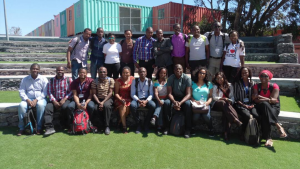PhD specialization course on Land Economics and Governance
A PhD specialization course on Land Economics and Governance was conducted at the University of Cape Town (UCT) in South Africa from 8 January to 9 February 2018. The five weeks course was organised by the African Economic Research Centre (AERC) in cooperation with UCT, World Bank and GIZ. This intensive PhD course aimed to help build and strengthen the analytical capacity in Land Economics and Governance in Africa by equipping participating PhD students with the latest theories and tools to conduct state of the art research in Land Governance.
The course was targeted at both students and practitioners in Economics, Agricultural Economics, Development Economics or other relevant doctoral programs, with an interest in continuing research on a land-related topic. It was attended by more than 20 students from various African countries: Cameroon, Ethiopia, Ghana, Kenya, Liberia, Malawi, Senegal, Zimbabwe, South Africa, Swaziland, Uganda, Zambia, Zimbabwe, Chad, Mali, Rwanda, Nigeria and Tanzania. Bringing so many students together from all over the continent is a good way to build and support future research networks in this highly specialized area. The course was delivered by local and international experts on land related research of both academia and the World Bank, including internationally renowned economists such as Paul Collier from Oxford University.

“This is an insightful course that answers many contemporary Land Management problems in Africa. A timely initiative”!
PhD candidate
 Linking Economics and Land Governance
Linking Economics and Land Governance
The topics of economy and land are intrinsically linked. Considering the role and use of land, agricultural land management within an economy is of high importance particularly in African countries. Linking the disciplines of economics and land, and applying economic methods to the analysis of the governance of land use and urban areas helps addressing contemporary problems as well as more fundamental analysis of land-related challenges. For this reasons NELGA actively supports the inclusion of land matters in training and research on economics. The course participants were introduced to NELGA and ongoing activities, as for example a planned continent-spanning land data repository. The course participants will also be included in the NELGA alumni network to facilitate exchange beyond the end of the training course.
“This experience will help me to engage in doing research papers which can be packaged in such a way that it is accessible and can easily be understood by policy makers”.
PhD candidate (Ghana)

“This course has given me the privilege to learn about land related issues and challenges in other African countries”.
PhD Candidate (Malawi)
 Key modules
Key modules
The course covered the following key modules and seminars:
- Land ownership as a determinant of economic structure & political economy,
- Land Use, Land & other Markets and Structural Transformation,
- Economics of Urban Land Use and Policy,
- Using and Collecting Survey & Spatial Data on Land Tenure & Use,
- Introduction to GIS and Remote Sensing
- Evaluating the Impact of Land Related Policy Interventions
- Securing Customary Tenure Rights; Titling and the Alternatives
- Urban land & Cities
- Land Grabbing in Africa
- Preference Heterogeneity and effectiveness of behavior change interventions.